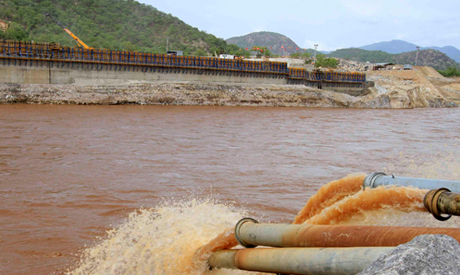
Water gushes out from pipes by the construction of Ethiopia's Great Renaissance Dam in Guba Woreda, some 40 km (25 miles) from Ethiopia's border with Sudan, June 28, 2013 (Photo: Reuters)
Egypt's foreign ministry expressed on Saturday "deep concern" that the Ethiopian government has not yet responded to an Egyptian invitation to discuss the dispute over Ethiopia's Grand Renaissance Dam project.
"Egypt is deeply worried that Ethiopia has not yet reacted to the invitation by Egypt's water and irrigation minister for a meeting in Cairo on the consequences of the dam," foreign ministry spokesman Badr Abd El-Aty said.
The statement was given just days after Egypt's interim cabinet was formed, emphasising the new government's commitment to solving Egypt's water crisis.
In June, Egypt, Sudan and Ethiopia agreed to start negotiations on recommendations made by an international technical committee on the Renaissance Dam project, after Egypt's former foreign minister Mohamed Kamel Amr visited Ethiopia and Sudan to discuss the issue.
Ethiopia's planned $4.2 billion hydro-electric dam on the Blue Nile has been a source of concern for the Egyptian government, which fears that the project, if completed, could negatively impact the volume of Nile water reaching Egypt. Sudan, another downstream country, could also be affected by the dam.
In the statement, Abd El-Aty stressed that Egypt's "water security is not to be haggled with," condemning Ethiopia's continued construction on the dam while "ignoring the technical committee's recommendations."
Abd El-Aty said that "no more time should be wasted in proceeding with the technical studies" on the dam. These studies are necessary to know the degree of the dam's potential impact on water flow to Egypt, according to the statement.
The ministry's spokesman also said that he hopes the parties reach a consensus that guarantees the interests of all.
For decades, Egypt held veto rights over all upstream projects, following powers granted by a 1929 colonial-era treaty with Britain.
Egypt's subsequent 1959 deal with Sudan divided the Nile's waters between the two countries, with Egypt taking 55.5 billion cubic metres of a total 74 billion allocated yearly.
According to Egypt's National Planning Institute, Egypt will require an additional 21 billion cubic metres of water per year by 2050, on top of its current annual allotment, to meet the needs of a projected population of 150 million.
Short link: